By C. Todd Lopez
KWAJALEIN, Republic of the Marshall Islands (March 01, 2011) -- While you probably should, you really don't need to look both ways when you cross a street on Kwajalein.
The speed limit is 15 mph, and most people ride a bike to work, including the installation commander.
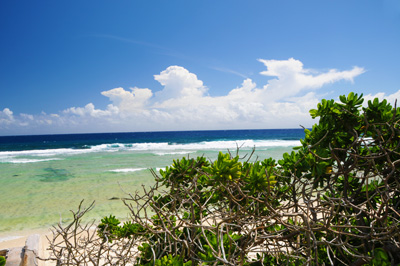
"Some people liken this place to the 1960s," said Col. Joseph N. Gaines, commander, U.S. Army Kwajalein Atoll. "We only have a few TV channels. There are no cell phones and we don't have high-speed Internet. Nobody has a car here, so we ride our bikes. And entertaining here is less centered around electronics and more centered around what you and your neighbors do."
Kwajalein Island, about 3.3 miles from one end to the other, is the largest of about 97 coral islands in the Kwajalein Atoll. The circle of islands is one of 29 that make up the Republic of the Marshall Islands. The U.S. has had military personnel there since it ousted the Japanese in February 1944, during Operation Flintlock -- part of America's Pacific campaign during World War II.
Today, Kwajalein Island and about 10 other islands in the atoll are used by the Army as part of the Ronald Reagan Ballistic Missile Defense Test Site. About 1,200 Americans live on the island -- including about 700 defense contractors, 50 government civilians, 12 Soldiers and the Families of American workers.
There's no cell service on Kwajalein, the cable TV includes about three channels from the American Forces Network and checking your e-mail still involves a telephone line and modem.
"I don't think you'll find this anywhere else in the world," said Gaines. "Technology has pretty much reached the entire globe. And we're pretty much high-tech from the mission side, but lifestyle-wise, we're low-tech."
Gaines said a recently installed undersea fiber optic cable will provide better data rates. The new cable, called HANTRU1, stretches more than 1,800 miles from Kwajalein to Guam. The line could ultimately carry 160 gigabits per second over two fiber pairs.
"There's going to be a non-mission aspect to that which will bring high-speed (Internet) to the island," Gaines said. "That will allow people to do voice-over-Internet. It will also allow people to stream television, and all kinds of things that drove Americans into their homes and away from entertainment with the neighbors. That hasn't happened here yet, but it is coming. We'll see how that affects the island."
For residents of Kwajalein today, entertainment means being outside with neighbors, playing sports and taking advantage of what nature has provided: water, sand and sun.
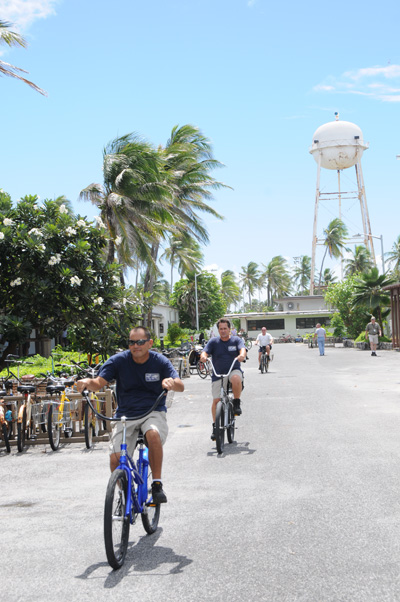
"We play a lot of sports -- I coached softball, so both of the kids play," said Callie Chavana, a long-time resident of Kwajalein. "We do a lot of things outdoors. Every Monday is the day we go to the beach, and about once a week the kids get to have a play date and invite a friend over to the house."
Chavana has been on Kwajalein for four years, and is now an Army civilian. She lives on the island with her two children and husband. Her parents also live on Kwajalein -- they too are employees. Chavana is a "retread," someone who lived on Kwajalein before -- she graduated from the high school there and came back as an adult.
"This place has a history of re-treads," said Gaines. "They're people that come back again and again. Almost everybody here is either a longterm resident or a retread."
It's the lifestyle and safety of island life, said Chavana, which made her want to bring her Family.
"The children have a lot more freedom than they would in the United States," she said. "They leave in the morning on their own to ride to school and I can meet them home for lunch."
There's really no crime on the island -- everybody is there with the Army's permission, and everybody has a job. So the safety, sense of community, and almost non-existent commute for most people, are big draws.
"We have a lot more freedom here than in the States," said Evan Rowell, a 12-year-old student at George Seitz Elementary School.
"We can ride our bikes everywhere and play all around the island," said his brother, 9-year-old Carson Rowell, also a student at the school.
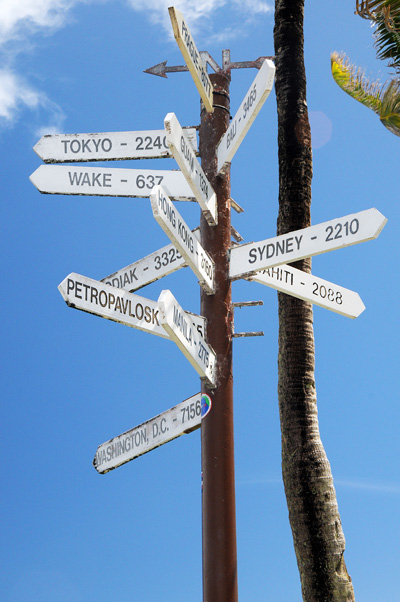
He agreed the safety of the island allows kids a freedom sometimes not seen stateside. "In the United States you can't really go anywhere. You can only stay in your house or go out in your yard and stuff."
Evan and Carson live on the island with their mother, Heidi Rowell, and their father, Chief Warrant Officer 3 James Rowell.
"We're here for two years and we extended for a third year," said Heidi. The Family came from a previous assignment at Fort Eustis, Va. "It's so safe here. There's no crime, and no need to worry about them getting in trouble. It's like a small American town in the middle of the ocean. Everybody looks out for each other. It's just a 3-milelong island and you'd think you would get bored, but you never get bored."
Heidi said she likes to scuba, a hobby enjoyed by many on the island. And the small size of the island, its white sandy beaches and close proximity to crystal-clear blue water, make it easy for her to fit her hobby into her day.
"I drop my kids off at school -- they are all in elementary school, except for my 4-year-old. I can drop her off in the afternoon and grab a tank and go diving with a friend and be back by 3:30 to pick her up," Heidi said.
Scuba is one of the most popular activities for residents, said the island's community activities director, Steven Gauthier.
"I believe the biggest club is the scuba club, which by (its) own statistics has more dives on an annual basis than any other club (in) the world," he said. Gauthier estimates 75 percent of islanders participate in the scuba club.
Besides managing the island's recreational activities -- something Gauthier said is critical to maintaining morale -- his office also handles the island's hospital, post office and food-service operations.
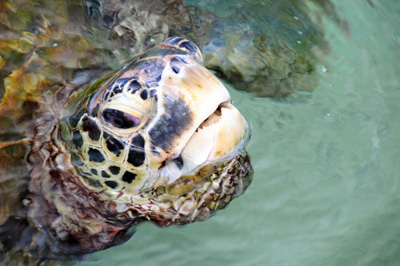
"We have to be really responsive to the customer," Gauthier said. "We try to meet their needs as much as possible, because there is no alternative. In Germany and Korea you can at least go outside the gate and do things like karaoke or the clubs. Here, there's nothing outside the gate."
To keep the 1,200 islanders occupied when they are not at work, school or church, Gauthier says there's a sizable array of options. There's a bowling alley, and two theaters, for instance. And one of those theaters is a "drive-in," where residents show up on their bicycles. There's also a nine-hole golf course, fishing, diving, boating and snorkeling. There's even a yacht club.
But many of the activities are supported through organizations staffed by the residents themselves, who are volunteers.
"It's a small island, and there's not a lot to do," Gauthier said. "If you don't make it or create it yourself, it's not going to happen. A private organization gives you a chance to get together with people with like-interests and gives you a little motivation to come up with these activities and keep them going. Without the private organizations, it would be a much quieter place."
There are nearly 40 such organizations on Kwajalein, which include the yacht club, diving club, golfing club and surf club. There's even a shortwave radio club, Gauthier said.
Volunteer work on Kwajalein is big. People there are boxed in by the island's size and location (Hawaii is an expensive, five-hour plane ride from the island), so volunteering keeps many busy.
"I do a lot of volunteering," said Heidi. "If you've never volunteered before, this is the place where they need it. There is no one else out here. You're in the middle of the ocean, and to make things happen, you have to get out there. You have to get involved."
Aaron Mathison, a senior at the Kwajalein Junior-Senior High School, has occupied at least some of his time on the island with volunteer work and with the Boy Scouts. He and other members of the National Honor Society went to Ebeye Island, just north of Kwajalein, to volunteer. Ebeye is an island of about 15,000 Marshallese civilians.
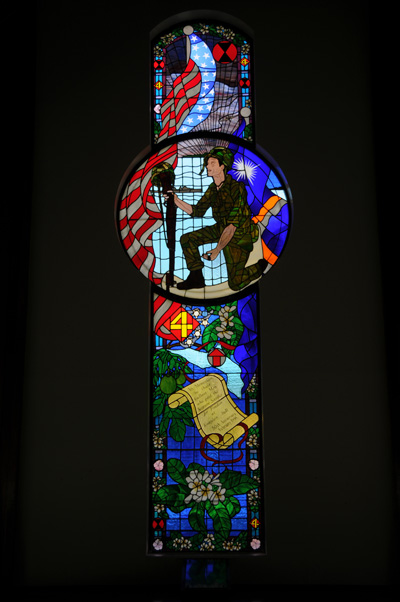
"We went in and asked all the schools there for a wish list to do fundraisers for school supplies," he said. As part of the Kwajalein's Keystone Club, he helped bring sporting equipment to Ebeye as well. And with the Boy Scouts, he helped out in Ebeye's schools.
"We built bookshelves for the schools and then they have wooden partitions (so) we painted and fixed those," Mathieson said. "When you go over there, the little kids want to hold your hand and stand next to you. That's a good feeling to help them out."
Lisa Ansley, wife of Lt. Col. Steven Ansley -- now stationed in Afghanistan -- volunteers with the Yokwe Yuk Women's Club and the American Legion. She's also a substitute teacher and works in the school's library. She said volunteering on Kwajalein helps her meet people.
"The best part is, you get to know everybody," she said. "You go to church with the same people you go to school with and the same people that you do your evening activities with, and hopefully you get along. Generally it's great here, it's a tight community."
Ansley's husband had been assigned to USAKA following an assignment in northern Virginia. After finishing his tour at Kwajalein, he was deployed to Afghanistan. His Family, including Lisa and two daughters, Heather Ansley, 8, and Nikky Ansley, 11, were allowed to stay behind while he completed his deployment.
The two girls say they don't miss much about the United States.
"The only thing I miss is snow and water parks," said Nikky. "And my friends."
Her younger sister was of the same mind.
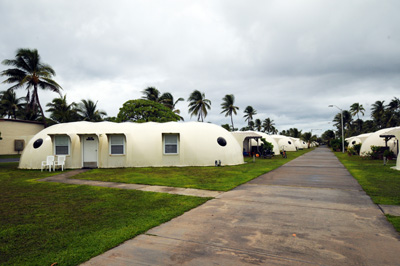
"My friends and teacher," Heather said. "And restaurants. And now when we go back to the States -- well, I'm sick of cars. Being here so long makes me feel that cars are ick."
"I will never want a car, even when I turn 16," Nikky said. "Never ever, ever."
Their mother said it was the traffic she didn't miss -- especially in the Washington, D.C. area. It was traffic and distance that kept her Family apart, she said.
"The things that I've got here that I specifically don't miss about the States are much more in the forefront of my mind," Lisa said. "I don't miss traffic and I don't miss having to get in the car. I don't miss having to miss one soccer game because it's all the way on the other side of the county while I'm at another soccer game. Here I can say you go to your game and you go to your game. And because they are two blocks apart, I can spend half the time at each."
Chavana said she loves being on Kwajalein. But for the sake of her two children, she wants to make sure they get back to the U.S., just so they can learn what life in the real world is like.
"I think there's probably a part of normalcy they miss here," she said. "I graduated with some kids that were born here and had never lived in the United States. I would not recommend it. I think kids definitely need to know what the States are like."
While Kwajalein is certainly not the U.S., and life there is greatly different than even life on a military installation in Germany, Italy, Korea or Japan, the Army has made sure that the same things available to those living at any military base are available to those on Kwajalein.
Housing on Kwajalein, for instance, is free. And the "downtown" area of the island includes a dive shop, the Micronesian gift shop, an exchange, and a shoppette. There's even the full contingent of AAFEES-contracted fast-food options, including a Burger King, Baskin-Robbins, Subway and Anthony's Pizza.
And close by is a dining facility for those on the island who are unaccompanied, and a grocery store for those who brought their Families. And for a grocery store that gets shipments by helicopter and a twice-monthly barge, it's fairly well stocked, residents say.
"I was pleasantly surprised when I got here at the fruits and vegetables the grocery store has," said Karen Klumb. "We were in Okinawa and also in Australia and it was real hard to get a lot of the fresh fruits and vegetables where we worked, because we were so remote. I figured this was even more remote so we would have less. But in reality, we can get almost anything here."
Klumb is an Army employee on unpaid leave to Kwajalein from her job at White Sands Missile Range, N.M. She came to the island to be with her husband, who took a job at USAKA. While she doesn't have a paid job on Kwajalein, she volunteers as part of the Yokwe Yuk Women's Club, and serves as treasurer for the Micronesian gift shop.
Probably the greatest benefit of living on Kwajalein, islanders say, is that the small size of the island and its isolation mean Families who live there can spend more time together.
Heather Mayer, whose husband, Ralph Mayer, brought her and their two young children, Katelyn Mayer, 7, and Nathan Mayer, 5, to live on Kwajalein almost two years ago, explained: "We get a better chance here to spend quality time together. And we spend almost every lunch together. That is something we would not get in the States."